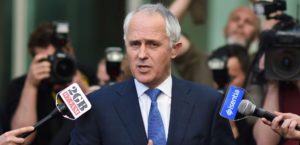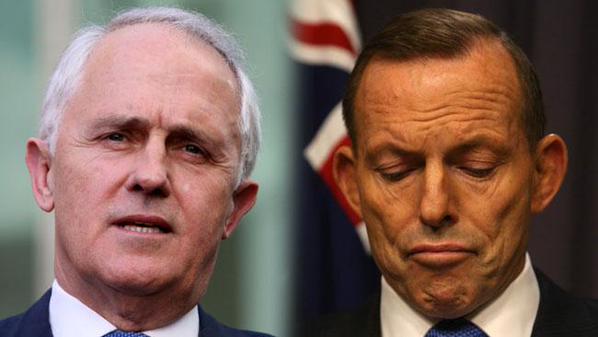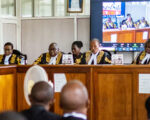>> Malcolm Turnbull says US gay marriage judgment adds to momentum in Australia
[spacer]
Dans une déclaration surprise, Malcom Turnbull, un des ministres les plus en vue du gouvernement, avait annoncé qu’il abandonnait son portefeuille des Communications pour défier Tony Abbott à la tête du parti. Il vient de remporter ce lundi 14 septembre le vote du parti conservateur face au Premier ministre, devenu de plus en plus impopulaire.
Il devra ainsi lui céder la place à la tête du gouvernement, deux ans tout juste après son arrivée au pouvoir.
 Malcom Turnbull, 60 ans, ancien avocat et ancien banquier, a recueilli 54 voix lors d’un vote des parlementaires du Parti libéral membre de la coalition conservatrice au pouvoir, a annoncé un parlementaire conservateur.
Malcom Turnbull, 60 ans, ancien avocat et ancien banquier, a recueilli 54 voix lors d’un vote des parlementaires du Parti libéral membre de la coalition conservatrice au pouvoir, a annoncé un parlementaire conservateur.
En juin dernier, après l’annonce de la légalisation du mariage pour tous dans l’ensemble des États-Unis, Malcolm Turnbull saluait la décision de la Cour Suprême américaine, confiant dans une interview : “L’amour c’est l’amour ! Mes opinions n’ont jamais changé. Je suis pour la reconnaisse du mariage des couples de même sexe.“
Tony Abbott avait fait bloqué des projets, dont un texte pourtant présenté il y a quelques semaine, grâce au soutien des deux tiers des conservateurs. Le vote de conscience avait également été rejeté et les députés menacés d’expulsion du parti s’ils ne suivaient pas la ligne du gouvernement, avec comme seule promesse la remise de la question à la prochaine législature.
Les sondages révèlent que 75% des australiens soutiennent le mariage pour tous et “tous les pays anglo-saxons avec lesquels nous sommes proches, la Grande-Bretagne, l’Irlande, le Canada, la Nouvelle-Zélande, ou encore l’Afrique du Sud… sont allés dans ce sens”, soulignait déjà Malcolm Turnbull : “Alors, oui, je pense que le vote historique de États-Unis a largement influencé le débat… et que nous devrions organiser un vote libre.”
Il a expliqué qu’il avait choisi de croiser le fer avec le chef du gouvernement car les conservateurs risquaient de perdre les prochaines élections. Le Premier ministre a alors organisé un vote du Parti libéral.
Stop Homophobie
[spacer]
>> The momentum for a vote on marriage equality to be held in Australia later this year appears to be growing, with Communications Minister Malcolm Turnbull saying that the US Supreme Court’s landmark ruling on Friday will “clearly” influence Australia.
“The fact is that there has been a sea change around the world,” Mr Turnbull said on Sunday morning, following the US Supreme Court’s ruling that state bans on same-sex marriage were unconstitutional, which effectively legalised gay marriage across the country.
“All of the English-speaking countries that we are closest to, Britain, Ireland, Canada, the United States, New Zealand, South Africa, they all allow gay marriage,” Mr Turnbull said. “Yes, my view is that we should have a free vote.
“If there is a free vote, I would vote for gay marriage.”
Mr Turnbull also backed Education Minister Christopher Pyne’s comments that “there’s every possibility” that parliament will vote on the issue when it returns in spring.
Prime Minister Tony Abbott reiterated his opposition to same-sex marriage on Sunday.
“I know not everyone shares that position but my own views on this subject are very well known and I’d like to assure you that they haven’t changed,” he said.
“Plainly there is a debate taking place in Australia. But let’s not forget that this is not a new debate.
“The debate found its way into the national parliament in the last term and there was a fairly decisive reaffirmation of the existing position,” he added, pointing to the Senate’s rejection of a bill to legalise same-sex marriage in 2012. Labor Senators had a free vote while Coalition Senators were bound to vote against the bill at the time.
However, Mr Abbott set conditions last month for a conscience vote in the Liberal Party room that could pave the way for a decision on same-sex marriage in Australia as early as August.
The conditions include a cross-party approach, rather than a private member’s bill such as that introduced by Labor leader Bill Shorten earlier this month.
“If our parliament were to make a big decision on a matter such as this, I want it to be owned by the parliament, and not by any particular party,” Mr Abbott said.
Others have brushed off the US decision, such as Liberal MP Dennis Jensen, who compared the issue to laws on marriage between first cousins.
“What next for the activist US Supreme Court? Now that they have forced gay marriage in all states, what about the different states’ laws on marriage between first cousins?” Mr Jensen wrote on his Facebook page.
“What will the US Supreme Court deem it to be in the name of equality? Force those states that allow first cousins to marry to ban it, or force those states that do not allow first cousins to marry to allow it?
“This is the conundrum when you get judiciaries that overstep their bounds.”

















